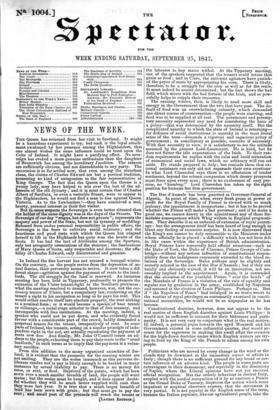In Ireland the fine harvest has not secured a tranquil
winter. On the contrary, as the people revive from the depression of ac- tual famine, their perversity seems to revive. It now takes a dif- ferent shape—agitation against the payment of rents to the land- lords. The old struggle for the land is renewed. An immense meeting has been held in Tipperary, professedly to promote the extension of the Ulster tenant-right to the Southern provinces : what the meeting resolved to demand, however, was, not the cus- tomary tenure of Ulster, but a compulsory law, conferring on the tenant a right to his occupation so long as he pays his rent. This would either resolve itself into absolute property, the rent sinking to a nominal form ; or it would become a species:of base tenure or villenage,—a social stage anterior to that of free tenancy, and incompatible with free institutions. At the meeting, indeed, a speaker who could not be put down, and who evidently found favour with a considerable part of the crowd, boldly demanded a perpetual tenure for the tenant,. irrespectively of rent. In some parts of Ireland, the tenants, acting on a similar principle of inde- pendent right in the soil, are actually repudiating the payment of rents now due. And finally, Mr. John O'Connell issues an ad- dress to the people, exhorting them to pay their rents to the " cruel
i landlords," in such terms as to imply that the payment is a volun- tary sacrifice.
From this addition to the many organized anarchies of Ire- land, it is evident that the prospects for the ensuing winter are not smiling. They are the worse inasmuch as this perverse de- liberate resolve not to pay is likely enough to be backed in many instances by actual inability to pay. There is no money for rates, or rent, or food. Deprived of the potato, which has been sown over a much smaller breadth of land, the people will want maize; but the maize must be bought, and it does appear doubt- ful whether they will be much better supplied with cash than they were last year. It is true that a much larger breadth of land has been sown with grain; but that must go to pay the rent; Ind small part of the prodeeds will reach the tenant or
the labourer to buy maize withal. At the Tipperary meeting, one of the speakers suggested that the tenants could retain that grain as food • and in Clare, the anti-rent agitators have punish- ed the payer of rents by appropriating his corn. There is likely, therefore, to be a struggle for the crop as well as for the rents. It must indeed be sooner determined; but the fact shows the bad faith which mixes with the had fortune of the Irish, and so pow- erfully helps to cripple their resources. The ensuing winter, then, is likely to need more skill and energy in the Government than the two that have past. The de- fault of food was an overwhelming calamity, which demanded one direct course of counteraction—the people were starving, and food was to be supplied at all cost. The paramount and peremp- tory necessity superseded any need for considering the basis of a policy—that was determined by the necessity itself. But the complicated anarchy to which the state of Ireland is returning— for defiance of social institutions is anarchy in the most literal sense of the term—demands a vigorous and sagacious policy of government ; as conciliatory as possible, coercive if necessary. With that necessity in view, it is satisfactory to see the attitude assumed by the present Lord-Lieutenant. He is kind, but he does not flatter the idle expectations of the Irish. To their ran- dom requirements he replies with the calm and lucid reiteration of economical and social laws, which no arbitrary will can set aside. He stands prepared to help ; but reminds them that ex- ternal assistance can only aid not supersede their own exertions. In what Lord Clarendon says there is no affectation of tender sentiment, beyond the solemn compassion which dreary prospects must force upon every man ; there is no exuberance of easy pro- mise no "humbug." Lord Clarendon has taken up the right position for humane but firm government.


























